
Here you can study for the exam. Look up keywords and learn definitions about all kind of subjects.
More subjects
Joseph Robinette Biden Jr. (/ˈbaɪdən/ ; born November 20, 1942) is an American politician who is the 46th and current president of the United States. A member of the Democratic Party, he previously served as the 47th vice president from 2009 to 2017 under President Barack Obama, and represented Delaware in the United States Senate from 1973 to 2009. Biden was born and raised in Scranton, Pennsylvania, and moved with his family to Delaware in 1953 when he was ten years old. He studied at the University of Delaware before earning his law degree from Syracuse University. He was elected to the New Castle County Council in 1970 and became the sixth-youngest senator in U.S. history after he was elected to the United States Senate from Delaware in 1972, at age 29. Biden was the chair or ranking member of the Senate Foreign Relations Committee for 12 years. He also chaired the Senate Judiciary Committee from 1987 to 1995; led the effort to pass the Violent Crime Control and Law Enforcement Act and the Violence Against Women Act; and oversaw six U.S. Supreme Court confirmation hearings, including the contentious hearings for Robert Bork and Clarence Thomas. (Source: Wikipedia.org, CC BY-SA)
Donald John Trump (born June 14, 1946) is an American politician, media personality, and businessman who served as the 45th president of the United States from 2017 to 2021. Trump graduated from the Wharton School of the University of Pennsylvania with a bachelor's degree in 1968. He became president of his father's real estate business in 1971 and renamed it The Trump Organization. He expanded the company's operations to building and renovating skyscrapers, hotels, casinos, and golf courses. He later started side ventures, mostly by licensing his name. From 2004 to 2015, he co-produced and hosted the reality television series The Apprentice. Trump and his businesses have been involved in more than 4,000 state and federal legal actions, including six bankruptcies. (Source: Wikipedia.org, CC BY-SA)
Barack Hussein Obama II (/bəˈrɑːk huːˈseɪn oʊˈbɑːmə/ bə-RAHK hoo-SAYN oh-BAH-mə; born August 4, 1961) is an American politician who served as the 44th president of the United States from 2009 to 2017. A member of the Democratic Party, Obama was the first African-American president of the United States. He previously served as a U.S. senator from Illinois from 2005 to 2008 and as an Illinois state senator from 1997 to 2004, and previously worked as a civil rights lawyer before entering politics. Obama was born in Honolulu, Hawaii. After graduating from Columbia University in 1983, he worked as a community organizer in Chicago. In 1988, he enrolled in Harvard Law School, where he was the first black president of the Harvard Law Review. After graduating, he became a civil rights attorney and an academic, teaching constitutional law at the University of Chicago Law School from 1992 to 2004. Turning to elective politics, he represented the 13th district in the Illinois Senate from 1997 until 2004, when he ran for the U.S. Senate. Obama received national attention in 2004 with his March Senate primary win, his well-received July Democratic National Convention keynote address, and his landslide November election to the Senate. In 2008, after a close primary campaign against Hillary Clinton, he was nominated by the Democratic Party for president and chose Joe Biden as his running mate. Obama was elected over Republican nominee John McCain in the presidential election and was inaugurated on January 20, 2009. Nine months later, he was named the 2009 Nobel Peace Prize laureate, a decision that drew a mixture of praise and criticism. (Source: Wikipedia.org, CC BY-SA)
George Walker Bush (born July 6, 1946) is an American politician who served as the 43rd president of the United States from 2001 to 2009. A member of the Republican Party, Bush family, and son of the 41st president George H. W. Bush, he previously served as the 46th governor of Texas from 1995 to 2000. While in his twenties, Bush flew warplanes in the Texas Air National Guard. After graduating from Harvard Business School in 1975, he worked in the oil industry. In 1978, Bush unsuccessfully ran for the House of Representatives. He later co-owned the Texas Rangers of Major League Baseball before he was elected governor of Texas in 1994. As governor, Bush successfully sponsored legislation for tort reform, increased education funding, set higher standards for schools, and reformed the criminal justice system. He also helped make Texas the leading producer of wind powered electricity in the nation. In the 2000 presidential election, Bush defeated Democratic incumbent Vice President Al Gore after a narrow and contested win that involved a Supreme Court decision to stop a recount in Florida. (Source: Wikipedia.org, CC BY-SA)
William Jefferson Clinton (né Blythe III; born August 19, 1946) is an American politician who served as the 42nd president of the United States from 1993 to 2001. He previously served as governor of Arkansas from 1979 to 1981 and again from 1983 to 1992, and as attorney general of Arkansas from 1977 to 1979. A member of the Democratic Party, Clinton became known as a New Democrat, as many of his policies reflected a centrist 'Third Way' political philosophy. He is the husband of Hillary Clinton, who was a senator from New York from 2001 to 2009, secretary of state from 2009 to 2013 and the Democratic nominee for president in the 2016 presidential election. Clinton was born and raised in Arkansas and attended Georgetown University. He received a Rhodes Scholarship to study at University College, Oxford and later graduated from Yale Law School. He met Hillary Rodham at Yale; they married in 1975. After graduating from law school, Clinton returned to Arkansas and won election as state attorney general, followed by two non-consecutive tenures as Arkansas governor. As governor, he overhauled the state's education system and served as chairman of the National Governors Association. Clinton was elected president in the 1992 presidential election, defeating incumbent Republican president George H. W. Bush and independent businessman Ross Perot. At 46 years old, he became the third-youngest president of the United States and the first president to be born in the Baby Boomer generation. (Source: Wikipedia.org, CC BY-SA)
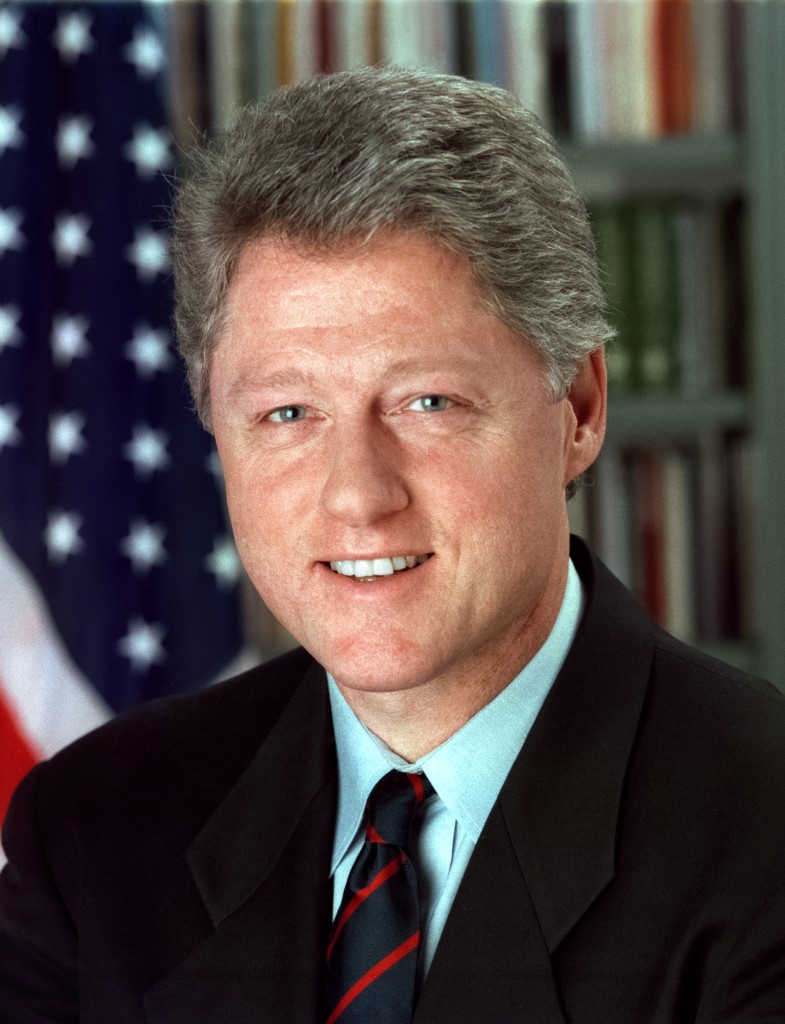 © Wikimedia.org/Bob McNeely, CC0
© Wikimedia.org/Bob McNeely, CC0
George Herbert Walker Bush (June 12, 1924 – November 30, 2018) was an American politician, diplomat, and businessman who served as the 41st president of the United States from 1989 to 1993. A member of the Republican Party, he previously served as the 43rd vice president from 1981 to 1989 under President Ronald Reagan, in the U.S. House of Representatives, as U.S. Ambassador to the United Nations, and as Director of Central Intelligence. Bush was raised in Greenwich, Connecticut, and attended Phillips Academy before serving in the United States Navy Reserve during World War II. After the war, he graduated from Yale and moved to West Texas, where he established a successful oil company. After an unsuccessful run for the United States Senate, he won election to the 7th congressional district of Texas in 1966. President Richard Nixon appointed Bush to the position of Ambassador to the United Nations in 1971 and to the position of chairman of the Republican National Committee in 1973. In 1974, President Gerald Ford appointed him as the Chief of the Liaison Office to the People's Republic of China, and in 1976, Bush became the Director of Central Intelligence. Bush ran for president in 1980, but was defeated in the Republican presidential primaries by Ronald Reagan, who then selected Bush as his vice presidential running mate. (Source: Wikipedia.org, CC BY-SA)
Ronald Wilson Reagan (/ˈreɪɡən/ RAY-gən; February 6, 1911 – June 5, 2004) was an American politician who served as the 40th president of the United States from 1981 to 1989. A member of the Republican Party from 1962 onward, he also served as the 33rd governor of California from 1967 to 1975 after having a career as a Hollywood actor and union leader. Reagan was born in Tampico, Illinois. He graduated from Eureka College in 1932 and began to work as a radio sports commentator in Iowa. In 1937, Reagan moved to California, where he found work as a film actor. From 1947 to 1952, Reagan served as president of the Screen Actors Guild, during which time he worked to root out alleged communist influence within it. In the 1950s, he moved to a career in television and became a spokesman for General Electric. From 1959 to 1960, he again served as president of the Screen Actors Guild. In 1964, his speech 'A Time for Choosing' earned him national attention as a new conservative figure. Building a network of supporters, Reagan was elected governor of California in 1966. During his governorship, he raised taxes, turned the state budget deficit into a surplus, challenged protesters at UC Berkeley, and ordered in National Guard troops during a period of protest movements. (Source: Wikipedia.org, CC BY-SA)
James Earl Carter Jr. (born October 1, 1924) is an American former politician who served as the 39th president of the United States from 1977 to 1981. A member of the Democratic Party, he previously served as the 76th governor of Georgia from 1971 to 1975 and as a Georgia state senator from 1963 to 1967. Since leaving office, Carter has remained engaged in political and social projects, receiving the Nobel Peace Prize in 2002 for his humanitarian work. Born and raised in Plains, Georgia, Carter graduated from the United States Naval Academy in 1946 with a Bachelor of Science degree and joined the United States Navy, serving on numerous submarines. After the death of his father in 1953, he left his naval career and returned home to Plains, where he assumed control of his family's peanut-growing business. He inherited comparatively little, because of his father's forgiveness of debts and the division of the estate amongst himself and his siblings. Nevertheless, his ambition to expand and grow the family's peanut farm was fulfilled. During this period, Carter was encouraged to oppose racial segregation and support the growing civil rights movement. He became an activist within the Democratic Party. From 1963 to 1967, Carter served in the Georgia State Senate, and in 1970 was elected as governor of Georgia, defeating former Governor Carl Sanders in the Democratic primary. He remained in office until 1975. Despite being a dark-horse candidate who was not well known outside of Georgia, he won the 1976 Democratic presidential nomination. In the 1976 presidential election, Carter ran as an outsider and narrowly defeated incumbent Republican president Gerald Ford. (Source: Wikipedia.org, CC BY-SA)
 © Wikimedia.org/Department of Defense, CC0
© Wikimedia.org/Department of Defense, CC0
Gerald Rudolph Ford Jr. (/ˈdʒɛrəld/ JERR-əld; born Leslie Lynch King Jr.; July 14, 1913 – December 26, 2006) was an American politician who served as the 38th president of the United States from 1974 to 1977. He was the only president never to have been elected to the office of president or vice president. He previously served as the leader of the Republican Party in the House of Representatives, and was appointed to be the 40th vice president in 1973. When President Richard Nixon resigned in 1974, Ford succeeded to the presidency, but was defeated for election to a full term in 1976. Born in Omaha, Nebraska, and raised in Grand Rapids, Michigan, Ford attended the University of Michigan, where he was a member of the school's football team, winning two national championships. Following his senior year, he turned down offers from the Detroit Lions and Green Bay Packers, instead opting to go to Yale Law School. After the attack on Pearl Harbor, he enlisted in the U.S. Naval Reserve, serving from 1942 to 1946; he left as a lieutenant commander. Ford began his political career in 1949 as the U.S. representative from Michigan's 5th congressional district. He served in this capacity for nearly 25 years, the final nine of them as the House minority leader. In December 1973, two months after the resignation of Spiro Agnew, Ford became the first person appointed to the vice presidency under the terms of the 25th Amendment. After the subsequent resignation of President Nixon in August 1974, Ford immediately assumed the presidency. (Source: Wikipedia.org, CC BY-SA)
Richard Milhous Nixon (January 9, 1913 – April 22, 1994) was the 37th president of the United States, serving from 1969 to 1974. A member of the Republican Party, he previously served as a representative and senator from California and was the 36th vice president from 1953 to 1961 under President Dwight D. Eisenhower. His five years in the White House saw reduction of U.S. involvement in the Vietnam War, détente with the Soviet Union and China, the first manned Moon landings, and the establishment of the Environmental Protection Agency and Occupational Safety and Health Administration. Nixon's second term ended early, when he became the only president to resign from office, as a result of the Watergate scandal. Nixon was born into a poor family of Quakers in a small town in Southern California. He graduated from Duke Law School in 1937, practiced law in California, then moved with his wife Pat to Washington in 1942 to work for the federal government. After active duty in the Naval Reserve during World War II, he was elected to the House of Representatives in 1946. His work on the Alger Hiss case established his reputation as a leading anti-Communist, which elevated him to national prominence, and in 1950, he was elected to the Senate. Nixon was the running mate of Dwight D. Eisenhower, the Republican Party's presidential nominee in the 1952 election, and served for eight years as the vice president. He ran for president in 1960, narrowly lost to John F. Kennedy, then failed again in a 1962 race for governor of California, after which it was widely believed that his political career was over. However, in 1968, he made another run for the presidency and was elected, defeating Hubert Humphrey and George Wallace in a close contest. (Source: Wikipedia.org, CC BY-SA)
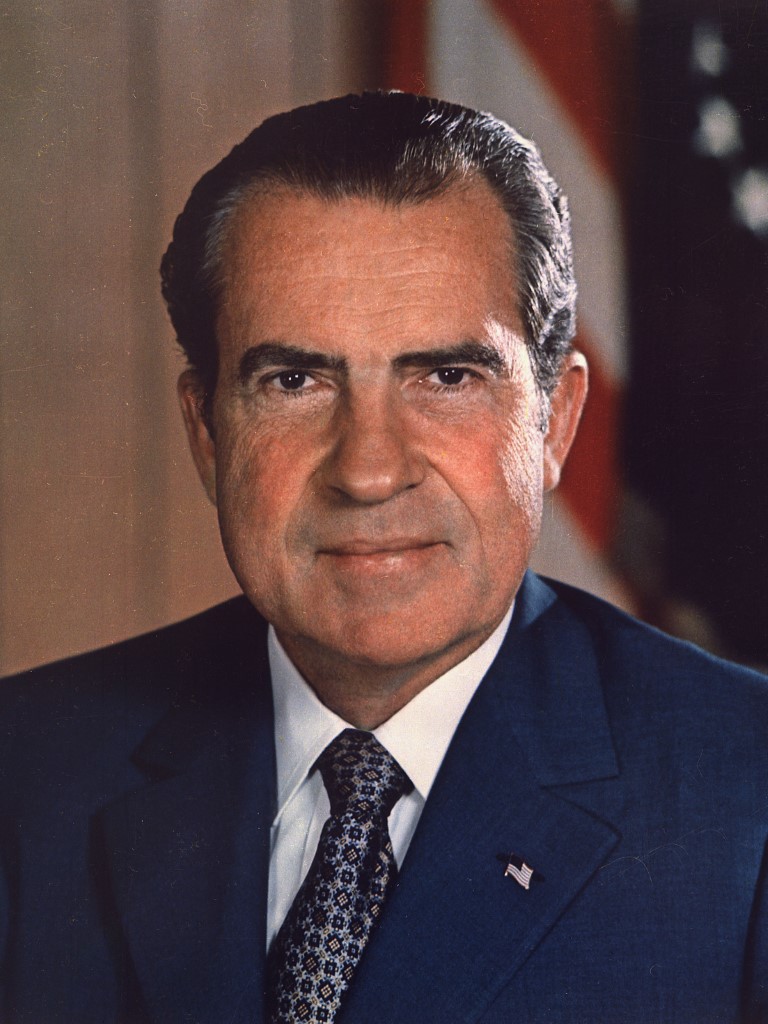 © Wikimedia.org/Department of Defense, CC0
© Wikimedia.org/Department of Defense, CC0
Lyndon Baines Johnson (/ˈlɪndən ˈbeɪnz/; August 27, 1908 – January 22, 1973), often referred to by his initials LBJ, was an American politician who served as the 36th president of the United States from 1963 to 1969. He had previously served as the 37th vice president from 1961 to 1963 under President John F. Kennedy, and was sworn in shortly after Kennedy's assassination. A Democrat from Texas, Johnson also served as a U.S. representative, U.S. senator and the Senate's majority leader. He holds the distinction of being one of the few presidents who served in all elected offices at the federal level. Born in a farmhouse in Stonewall, Texas, to a local political family, Johnson worked as a high school teacher and a congressional aide before winning election to the U.S. House of Representatives in 1937. He won election to the United States Senate in 1948 after a narrow and controversial victory in the Democratic Party's primary. He was appointed to the position of Senate Majority Whip in 1951. He became the Senate Democratic leader in 1953 and majority leader in 1954. In 1960 Johnson ran for the Democratic nomination for president. Ultimately, Senator Kennedy bested Johnson and his other rivals for the nomination, then surprised many by offering to make Johnson his vice presidential running mate. The Kennedy-Johnson ticket won in the 1960 presidential election. Vice President Johnson assumed the presidency on November 22, 1963, after President Kennedy was assassinated. The following year Johnson was elected to the presidency when he won in a landslide against Arizona Senator Barry Goldwater, receiving 61.1% of the popular vote in the 1964 presidential election, the largest share won by any presidential candidate since the 1820 election. (Source: Wikipedia.org, CC BY-SA)
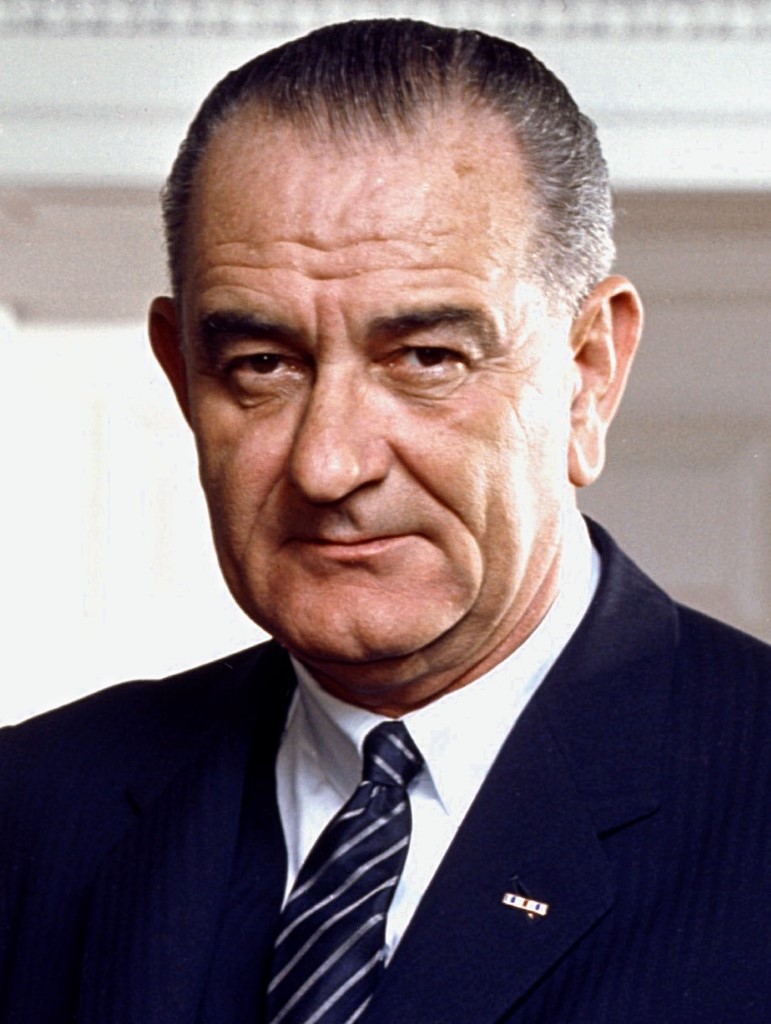 © Wikimedia.org/Arnold Newman, CC0
© Wikimedia.org/Arnold Newman, CC0
John Fitzgerald Kennedy (May 29, 1917 – November 22, 1963), often referred to by his initials JFK and the nickname Jack, was an American politician who served as the 35th president of the United States from 1961 until his assassination near the end of his third year in office. Kennedy was the youngest person to assume the presidency by election. He was also the youngest president at the end of his tenure. Kennedy served at the height of the Cold War, and the majority of his work as president concerned relations with the Soviet Union and Cuba. A Democrat, he represented Massachusetts in both houses of the U.S. Congress prior to his presidency. Born into the prominent Kennedy family in Brookline, Massachusetts, Kennedy graduated from Harvard University in 1940 before joining the U.S. Naval Reserve the following year. During World War II, he commanded a series of PT boats in the Pacific theater. Kennedy's survival of the sinking of PT-109 and rescue of his fellow sailors made him a war hero for which he earned the Navy and Marine Corps Medal, but left him with serious injuries. After a brief stint in journalism, Kennedy represented a working-class Boston district in the U.S. House of Representatives from 1947 to 1953. He was subsequently elected to the U.S. Senate and served as the junior senator for Massachusetts from 1953 to 1960. While in the Senate, Kennedy published his book, Profiles in Courage, which won a Pulitzer Prize. In the 1960 presidential election, he narrowly defeated Republican opponent Richard Nixon, who was the incumbent vice president. Kennedy's humor, charm, and youth in addition to his father's money and contacts were great assets in his campaign. Kennedy's campaign gained momentum after the first televised presidential debates in American history. He was the first Catholic elected president. (Source: Wikipedia.org, CC BY-SA)
 © Wikimedia.org/Cecil Stoughton, CC0
© Wikimedia.org/Cecil Stoughton, CC0
Dwight David 'Ike' Eisenhower (born David Dwight Eisenhower; /ˈaɪzənhaʊ.ər/; October 14, 1890 – March 28, 1969) was an American military officer and statesman who served as the 34th president of the United States from 1953 to 1961. During World War II, he served as Supreme Commander of the Allied Expeditionary Force in Europe and achieved the five-star rank of General of the Army. He planned and supervised the invasion of North Africa in Operation Torch in 1942–1943 as well as the invasion of Normandy (D-Day) from the Western Front in 1944–1945. Eisenhower was born into a large family of mostly Pennsylvania Dutch ancestry in Denison, Texas, and raised in Abilene, Kansas. His family had a strong religious background, and his mother became a Jehovah's Witness. Eisenhower, however, belonged to no organized church until 1952. He graduated from West Point in 1915 and later married Mamie Doud, with whom he had two sons. During World War I, he was denied a request to serve in Europe and instead commanded a unit that trained tank crews. Following the war, he served under various generals and was promoted to the rank of brigadier general in 1941. After the United States entered World War II, Eisenhower oversaw the invasions of North Africa and Sicily before supervising the invasions of France and Germany. After the war, he served as Army Chief of Staff (1945–1948), as president of Columbia University (1948–1953) and as the first Supreme Commander of NATO (1951–1952). (Source: Wikipedia.org, CC BY-SA)
 © Wikimedia.org/White House, CC0
© Wikimedia.org/White House, CC0
Harry S. Truman (May 8, 1884 – December 26, 1972) was the 33rd president of the United States, serving from 1945 to 1953. A leader of the Democratic Party, he previously served as the 34th vice president from January to April 1945 under Franklin Roosevelt and as a United States senator from Missouri from 1935 to January 1945. Assuming the presidency after Roosevelt's death, Truman implemented the Marshall Plan to rebuild the economy of Western Europe and established both the Truman Doctrine and NATO to contain the expansion of Soviet communism. He proposed numerous liberal domestic reforms, but few were enacted by the Conservative Coalition which dominated the Congress. Truman grew up in Independence, Missouri, and during World War I fought in France as a captain in the Field Artillery. Returning home, he opened a haberdashery in Kansas City, Missouri, and was elected as a judge of Jackson County in 1922. Truman was elected to the United States Senate from Missouri in 1934. In 1940–1944 he gained national prominence as chairman of the Truman Committee, which was aimed at reducing waste and inefficiency in wartime contracts. Only after assuming the presidency was he informed about the atomic bomb. Truman authorized the first and only use of nuclear weapons in war against Hiroshima and Nagasaki in Japan. Truman's administration engaged in an internationalist foreign policy by working closely with British Prime Minister Clement Attlee. Truman staunchly denounced isolationism. He energized the New Deal coalition during the 1948 presidential election and won a surprise victory against Republican Thomas E. Dewey that secured his own presidential term. (Source: Wikipedia.org, CC BY-SA)
 © Wikimedia.org/National Archives and Records Administration, CC0
© Wikimedia.org/National Archives and Records Administration, CC0
Franklin Delano Roosevelt (/ˈdɛlənoʊ/; /ˈroʊzəˌvɛlt, -vəlt/ ROH-zə-velt, -vəlt; January 30, 1882 – April 12, 1945), often referred to by his initials FDR, was an American politician and attorney who served as the 32nd president of the United States from 1933 until his death in 1945. As the leader of the Democratic Party, he won a record four presidential elections and became a central figure in world events during the first half of the 20th century. Roosevelt directed the federal government during most of the Great Depression, implementing his New Deal domestic agenda in response to the worst economic crisis in U.S. history. He built the New Deal Coalition, which defined modern liberalism in the United States throughout the middle third of the 20th century. His third and fourth terms were dominated by World War II, which ended in victory shortly after he died in office. (Source: Wikipedia.org, CC BY-SA)
 © Wikimedia.org/Leon A. Perskie, CC BY
© Wikimedia.org/Leon A. Perskie, CC BY
Herbert Clark Hoover (August 10, 1874 – October 20, 1964) was an American politician who served as the 31st president of the United States from 1929 to 1933 and a member of the Republican Party, holding office during the onset of the Great Depression in the United States. A self-made man who became rich as a mining engineer, Hoover led the Commission for Relief in Belgium, served as the director of the U.S. Food Administration, and served as the U.S. Secretary of Commerce.Hoover was born to a Quaker family in West Branch, Iowa, but he grew up in Oregon. He was one of the first graduates of the new Stanford University in 1895. He took a position with a London-based mining company working in Australia and China. He rapidly became a wealthy mining engineer. In 1914 at the outbreak of World War I, he organized and headed the Commission for Relief in Belgium, an international relief organization that provided food to occupied Belgium. When the U.S. entered the war in 1917, President Woodrow Wilson appointed Hoover to lead the Food Administration. He became famous as his country's 'food czar'. After the war, Hoover led the American Relief Administration, which provided food to the starving millions in Central and Eastern Europe, especially Russia. Hoover's wartime service made him a favorite of many progressives, and he unsuccessfully sought the Republican nomination in the 1920 presidential election. (Source: Wikipedia.org, CC BY-SA)
Calvin Coolidge (born John Calvin Coolidge Jr.; /ˈkuːlɪdʒ/; July 4, 1872 – January 5, 1933) was the 30th president of the United States from 1923 to 1929. Born in Vermont, Coolidge was a Republican lawyer from New England who climbed up the ladder of Massachusetts state politics, becoming the state's 48th governor. His response to the Boston Police Strike of 1919 thrust him into the national spotlight as a man of decisive action. Coolidge was elected the country's 29th vice president the next year, succeeding the presidency upon the sudden death of President Warren G. Harding in 1923. Elected in his own right in 1924, Coolidge gained a reputation as a small-government conservative distinguished by a taciturn personality and dry sense of humor, receiving the nickname 'Silent Cal.' Though his widespread popularity enabled him to run for a third term, he chose not to run again in 1928, remarking that ten years as president was (at the time) 'longer than any other man has had it – too long!' (Source: Wikipedia.org, CC BY-SA)
 © Wikimedia.org/Notman Studio, CC0
© Wikimedia.org/Notman Studio, CC0
Warren Gamaliel Harding (November 2, 1865 – August 2, 1923) was the 29th president of the United States, serving from 1921 until his death in 1923. A member of the Republican Party, he was one of the most popular sitting U.S. presidents. After his death, a number of scandals were exposed, including Teapot Dome, as well as an extramarital affair with Nan Britton, which diminished his reputation. Harding lived in rural Ohio all his life, except when political service took him elsewhere. As a young man, he bought The Marion Star and built it into a successful newspaper. Harding served in the Ohio State Senate from 1900 to 1904, and was lieutenant governor for two years. He was defeated for governor in 1910, but was elected to the United States Senate in 1914, the state's first direct election for that office. Harding ran for the Republican nomination for president in 1920, but was considered a long shot before the convention. When the leading candidates could not garner a majority, and the convention deadlocked, support for Harding increased, and he was nominated on the tenth ballot. He conducted a front porch campaign, remaining mostly in Marion, and allowed the people to come to him. He promised a return to normalcy of the pre-World War I period, and won in a landslide over Democrat James M. Cox, to become the first sitting senator elected president. (Source: Wikipedia.org, CC BY-SA)
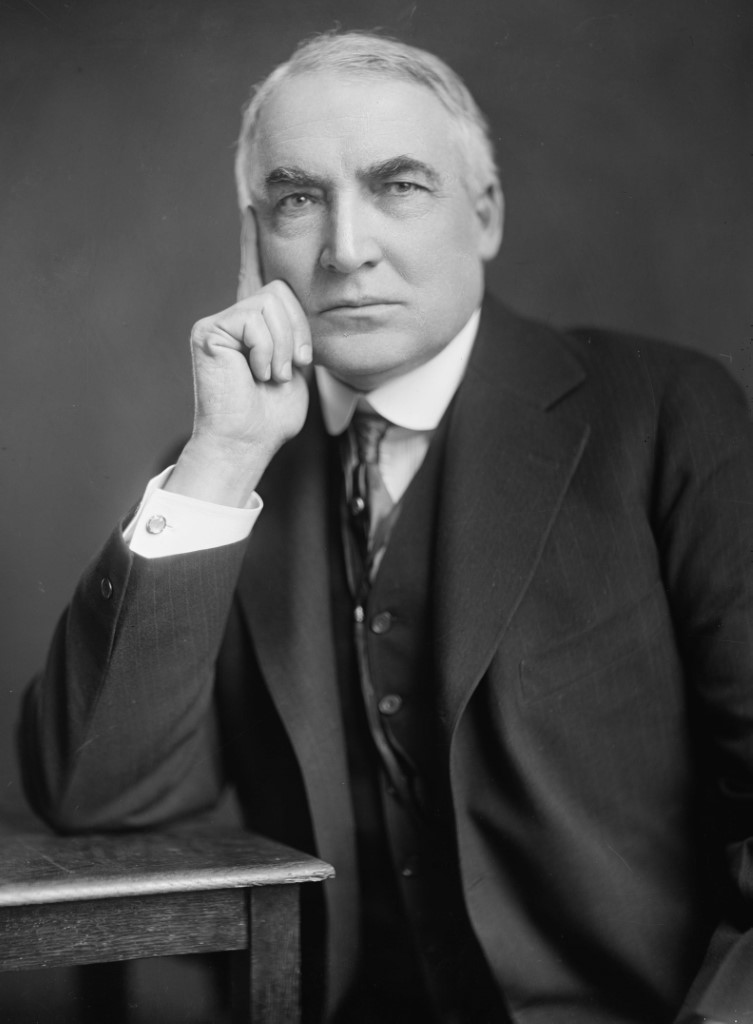 © Wikimedia.org/Harris & Ewing, CC0
© Wikimedia.org/Harris & Ewing, CC0
Thomas Woodrow Wilson (December 28, 1856 – February 3, 1924) was an American politician and academic who served as the 28th president of the United States from 1913 to 1921. A member of the Democratic Party, Wilson served as the president of Princeton University and as the governor of New Jersey before winning the 1912 presidential election. As president, Wilson changed the nation's economic policies and led the United States into World War I in 1917. He was the leading architect of the League of Nations, and his progressive stance on foreign policy came to be known as Wilsonianism. (Source: Wikipedia.org, CC BY-SA)
 © Wikimedia.org/Harris & Ewing, CC0
© Wikimedia.org/Harris & Ewing, CC0
William Howard Taft (September 15, 1857 – March 8, 1930) was the 27th president of the United States (1909–1913) and the tenth chief justice of the United States (1921–1930), the only person to have held both offices. Taft was elected president in 1908, the chosen successor of Theodore Roosevelt, but was defeated for reelection in 1912 by Woodrow Wilson after Roosevelt split the Republican vote by running as a third-party candidate. In 1921, President Warren G. Harding appointed Taft to be chief justice, a position he held until a month before his death. Taft was born in Cincinnati, Ohio, in 1857. His father, Alphonso Taft, was a U.S. attorney general and secretary of war. Taft attended Yale and joined the Skull and Bones, of which his father was a founding member. After becoming a lawyer, Taft was appointed a judge while still in his twenties. He continued a rapid rise, being named solicitor general and a judge of the Sixth Circuit Court of Appeals. In 1901, President William McKinley appointed Taft civilian governor of the Philippines. In 1904, Roosevelt made him Secretary of War, and he became Roosevelt's hand-picked successor. Despite his personal ambition to become chief justice, Taft declined repeated offers of appointment to the Supreme Court of the United States, believing his political work to be more important. (Source: Wikipedia.org, CC BY-SA)
 © Wikimedia.org/Harris & Ewing, CC0
© Wikimedia.org/Harris & Ewing, CC0
Theodore Roosevelt Jr. (/ˈroʊzəvɛlt/ ROH-zə-velt; October 27, 1858 – January 6, 1919), often referred to as Teddy or by his initials, T. R., was an American politician, statesman, soldier, conservationist, naturalist, historian, and writer who served as the 26th president of the United States from 1901 to 1909. He previously served as the 25th vice president under President William McKinley from March to September 1901 and as the 33rd governor of New York from 1899 to 1900. Assuming the presidency after McKinley's assassination, Roosevelt emerged as a leader of the Republican Party and became a driving force for anti-trust and Progressive policies. (Source: Wikipedia.org, CC BY-SA)
 © Wikimedia.org/Pach Bros, CC0
© Wikimedia.org/Pach Bros, CC0
William McKinley (January 29, 1843 – September 14, 1901) was the 25th president of the United States, serving from 1897 until his assassination in 1901. As a politician he led a realignment that made his Republican Party largely dominant in the industrial states and nationwide until the 1930s. He presided over victory in the Spanish–American War of 1898; gained control of Hawaii, Puerto Rico, the Philippines and Cuba; restored prosperity after a deep depression; rejected the inflationary monetary policy of free silver, keeping the nation on the gold standard; and raised protective tariffs to boost American industry and keep wages high. (Source: Wikipedia.org, CC BY-SA)
Stephen Grover Cleveland (March 18, 1837 – June 24, 1908) was an American lawyer and politician who served as the 22nd and 24th president of the United States from 1885 to 1889 and from 1893 to 1897. Cleveland is the only president in American history to serve two non-consecutive terms in office. He won the popular vote for three presidential elections—in 1884, 1888, and 1892—and was one of two Democrats (followed by Woodrow Wilson in 1912) to be elected president during the era of Republican presidential domination dating from 1861 to 1933. (Source: Wikipedia.org, CC BY-SA)
Benjamin Harrison (August 20, 1833 – March 13, 1901) was an American lawyer and politician who served as the 23rd president of the United States from 1889 to 1893. He was a member of the Harrison family of Virginia–a grandson of the ninth president, William Henry Harrison, and a great-grandson of Benjamin Harrison V, a founding father. Harrison was born on a farm by the Ohio River and graduated from Miami University in Oxford, Ohio. After moving to Indianapolis, he established himself as a prominent local attorney, Presbyterian church leader, and politician in Indiana. During the American Civil War, he served in the Union Army as a colonel, and was confirmed by the U.S. Senate as a brevet brigadier general of volunteers in 1865. Harrison unsuccessfully ran for governor of Indiana in 1876. The Indiana General Assembly elected Harrison to a six-year term in the Senate, where he served from 1881 to 1887. (Source: Wikipedia.org, CC BY-SA)
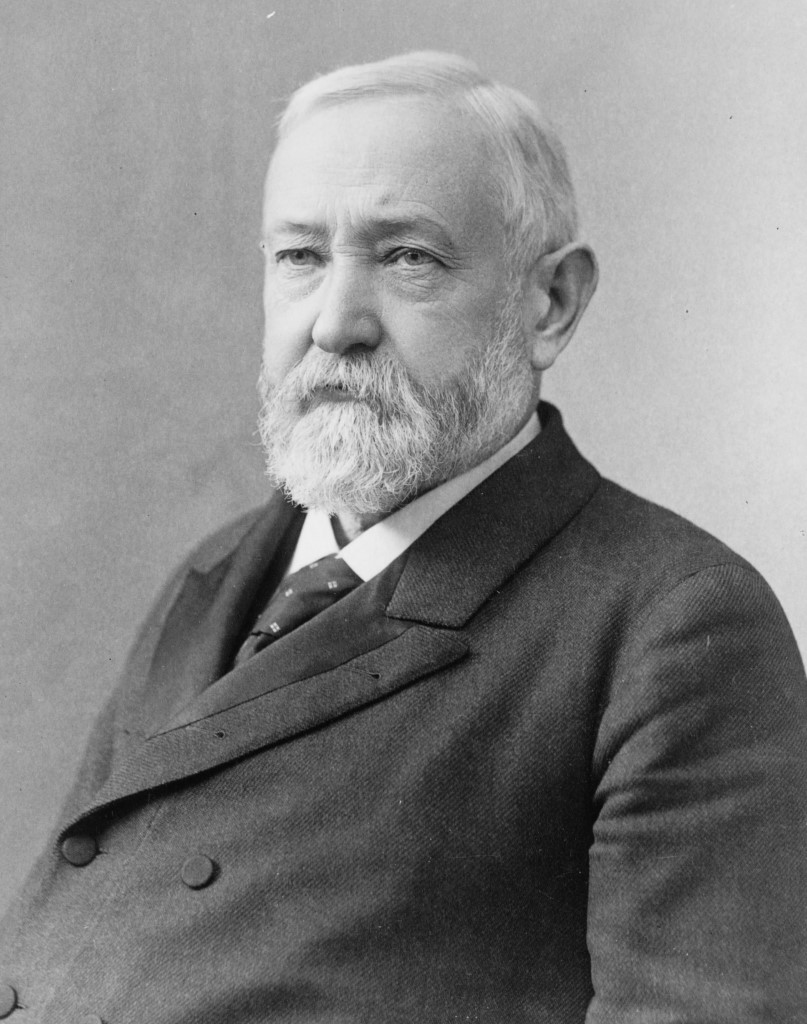 © Wikimedia.org/Pach Brothers, CC0
© Wikimedia.org/Pach Brothers, CC0
Chester Alan Arthur (October 5, 1829 – November 18, 1886) was an American lawyer and politician who served as the 21st president of the United States from 1881 to 1885. Previously the 20th U.S. vice president, he succeeded to the presidency upon the death of President James A. Garfield in September 1881, two months after Garfield was shot by an assassin. Arthur was born in Fairfield, Vermont, grew up in upstate New York and practiced law in New York City. He served as quartermaster general of the New York Militia during the American Civil War. Following the war, he devoted more time to New York Republican politics and quickly rose in Senator Roscoe Conkling's political organization. President Ulysses S. Grant appointed him to the post of Collector of the Port of New York in 1871, and he was an important supporter of Conkling and the Stalwart faction of the Republican Party. In 1878, President Rutherford B. Hayes fired Arthur as part of a plan to reform the federal patronage system in New York. Garfield won the Republican nomination for president in 1880, and Arthur was nominated for vice president to balance the ticket as an Eastern Stalwart. Four months into his term, Garfield was shot by an assassin; he died 11 weeks later, and Arthur assumed the presidency. (Source: Wikipedia.org, CC BY-SA)
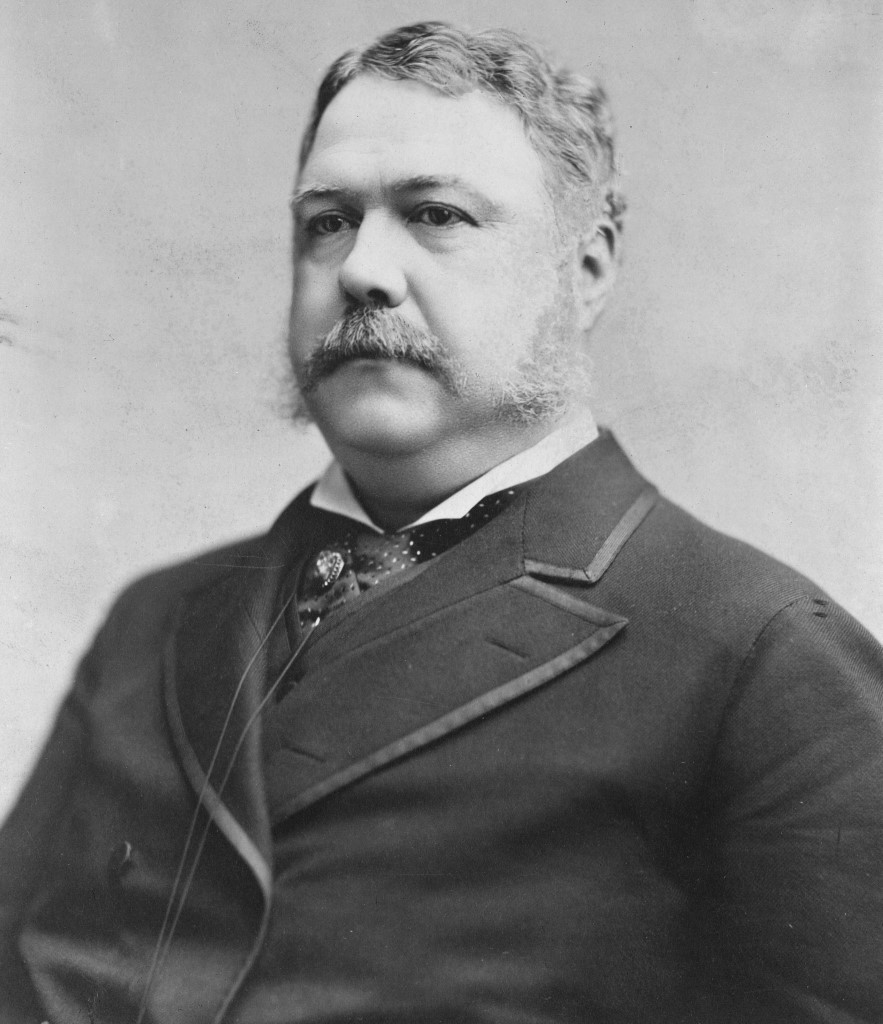 © Wikimedia.org/Charles Milton Bell, CC0
© Wikimedia.org/Charles Milton Bell, CC0
James Abram Garfield (November 19, 1831 – September 19, 1881) was the 20th president of the United States, serving from March 4, 1881, until his death six months later—two months after he was shot by an assassin. A lawyer and Civil War general, he served nine terms in the United States House of Representatives and was the only sitting member of the House to be elected president. Before his candidacy for the White House, he had been elected to the U.S. Senate by the Ohio General Assembly—a position he declined when he became president-elect. (Source: Wikipedia.org, CC BY-SA)
 © Wikimedia.org/Brady-Handy Photograph Collection, CC0
© Wikimedia.org/Brady-Handy Photograph Collection, CC0
Rutherford Birchard Hayes (/ˈrʌðərfərd/; October 4, 1822 – January 17, 1893) was an American lawyer and politician who served as the 19th president of the United States from 1877 to 1881, after serving in the U.S. House of Representatives and as governor of Ohio. Before the American Civil War, Hayes was a lawyer and staunch abolitionist who defended refugee slaves in court proceedings. He served in the Union Army and the House of Representatives before assuming the presidency. His presidency represents a turning point in U.S. history, as historians consider it the formal end of Reconstruction. Hayes, a prominent member of the Republican 'Half-Breed' faction, placated both Southern Democrats and Whiggish Republican businessmen by ending the federal government's involvement in attempting to bring racial equality in the South. (Source: Wikipedia.org, CC BY-SA)
Ulysses S. Grant (born Hiram Ulysses Grant /ˈhaɪrəm juːˈlɪsiːz/ HY-rəm yoo-LISS-eez; April 27, 1822 – July 23, 1885) was an American military officer and politician who served as the 18th president of the United States from 1869 to 1877. As Commanding General, he led the Union Army to victory in the American Civil War in 1865 and thereafter briefly served as Secretary of War. Later, as president, Grant was an effective civil rights executive who signed the bill that created the Justice Department and worked with Radical Republicans to protect African Americans during Reconstruction. (Source: Wikipedia.org, CC BY-SA)
Andrew Johnson (December 29, 1808 – July 31, 1875) was the 17th president of the United States, serving from 1865 to 1869. He assumed the presidency as he was vice president at the time of the assassination of Abraham Lincoln. Johnson was a Democrat who ran with Lincoln on the National Union ticket, coming to office as the Civil War concluded. He favored quick restoration of the seceded states to the Union without protection for the newly freed people who were formerly enslaved. This led to conflict with the Republican-dominated Congress, culminating in his impeachment by the House of Representatives in 1868. He was acquitted in the Senate by one vote. (Source: Wikipedia.org, CC BY-SA)
Abraham Lincoln (/ˈlɪŋkən/ LINK-ən; February 12, 1809 – April 15, 1865) was an American lawyer, politician, and statesman who served as the 16th president of the United States from 1861 until his assassination in 1865. Lincoln led the nation through the American Civil War and succeeded in preserving the Union, abolishing slavery, bolstering the federal government, and modernizing the U.S. economy. (Source: Wikipedia.org, CC BY-SA)
James Buchanan Jr. (/bjuːˈkænən/ bew-KAN-ən; April 23, 1791 – June 1, 1868) was an American lawyer, diplomat and politician who served as the 15th president of the United States from 1857 to 1861. He previously served as secretary of state from 1845 to 1849 and represented Pennsylvania in both houses of the U.S. Congress. He was an advocate for states' rights, particularly regarding slavery, and minimized the role of the federal government preceding the Civil War. Buchanan was the last president born in the 18th century. (Source: Wikipedia.org, CC BY-SA)
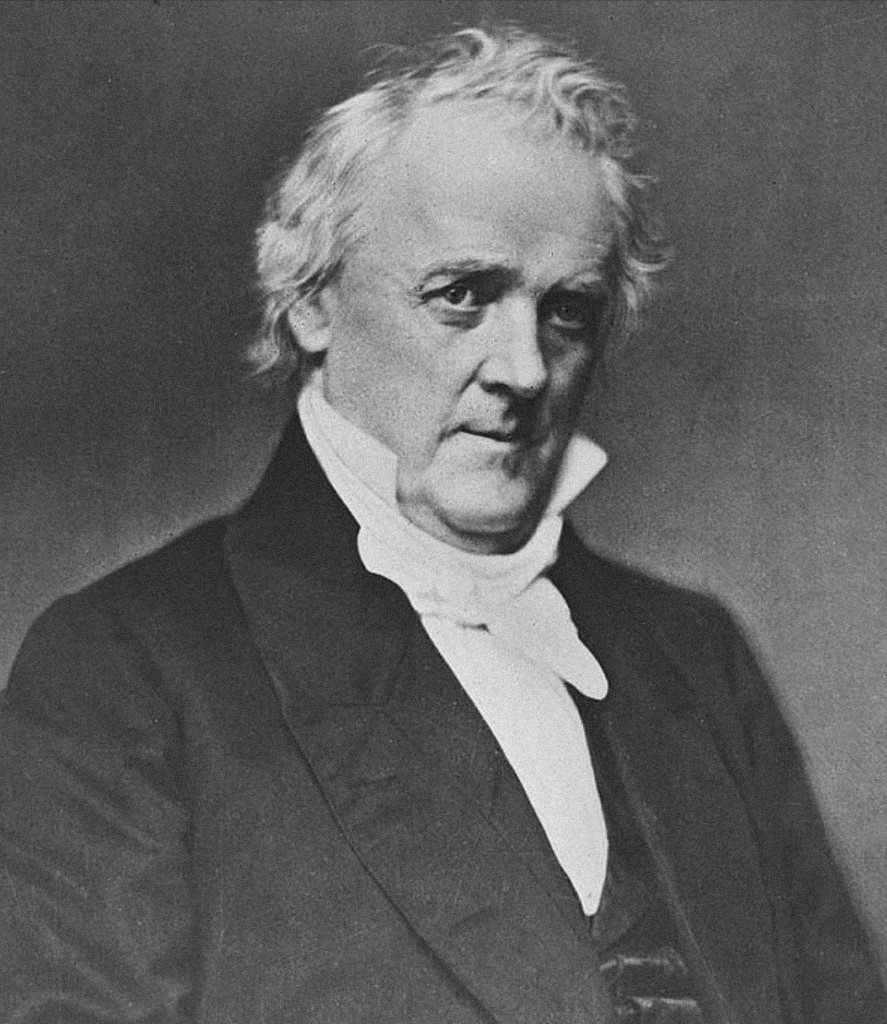 © Wikimedia.org/Mathew Brady, CC0
© Wikimedia.org/Mathew Brady, CC0
Franklin Pierce (November 23, 1804 – October 8, 1869) was the 14th president of the United States, serving from 1853 to 1857. He was a northern Democrat who believed that the abolitionist movement was a fundamental threat to the nation's unity. He alienated anti-slavery groups by signing the Kansas–Nebraska Act and enforcing the Fugitive Slave Act. Conflict between North and South persisted until Southern states seceded and the American Civil War began in 1861. (Source: Wikipedia.org, CC BY-SA)
Millard Fillmore (January 7, 1800 – March 8, 1874) was the 13th president of the United States, serving from 1850 to 1853, the last to be a member of the Whig Party while in the White House. A former member of the U.S. House of Representatives from Upstate New York, Fillmore was elected as the 12th vice president of the United States in 1848, and succeeded to the presidency in July 1850 upon the death of U.S. President Zachary Taylor. Fillmore was instrumental in the passing of the Compromise of 1850, a bargain that led to a brief truce in the battle over the expansion of slavery. He failed to win the Whig nomination for president in 1852 but gained the endorsement of the nativist Know Nothing Party four years later and finished third in the 1856 presidential election. (Source: Wikipedia.org, CC BY-SA)
Zachary Taylor (November 24, 1784 – July 9, 1850) was an American military leader who served as the 12th president of the United States from 1849 until his death in 1850. Taylor was a career officer in the United States Army, rising to the rank of major general and becoming a national hero for his victories in the Mexican–American War. As a result, he won election to the White House despite his vague political beliefs. His top priority as president was to preserve the Union. He died 16 months into his term, having made no progress on the most divisive issue in Congress and the nation: slavery. (Source: Wikipedia.org, CC BY-SA)
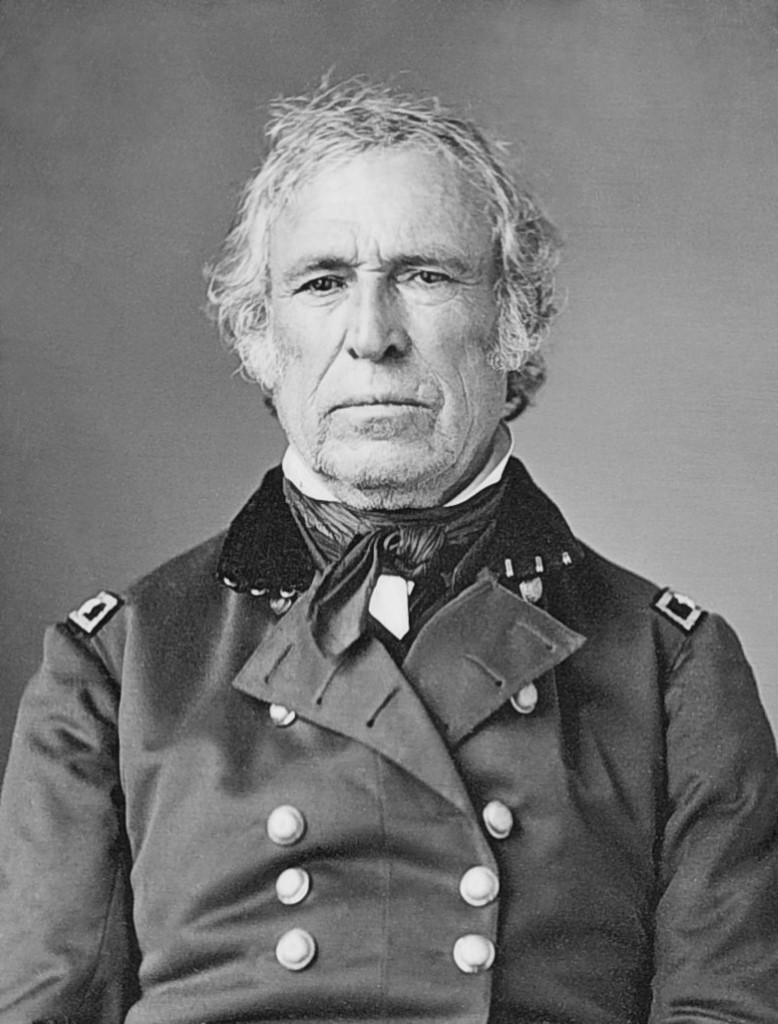 © Wikimedia.org/Maguire of New Orleans, CC0
© Wikimedia.org/Maguire of New Orleans, CC0
James Knox Polk (November 2, 1795 – June 15, 1849) was the 11th president of the United States, serving from 1845 to 1849. He previously was the 13th speaker of the House of Representatives (1835–1839) and ninth governor of Tennessee (1839–1841). A protégé of Andrew Jackson, he was a member of the Democratic Party and an advocate of Jacksonian democracy. Polk is chiefly known for extending the territory of the United States through the Mexican–American War; during his presidency, the United States expanded significantly with the annexation of the Republic of Texas, the Oregon Territory, and the Mexican Cession following American victory in the Mexican–American War. (Source: Wikipedia.org, CC BY-SA)
John Tyler (March 29, 1790 – January 18, 1862) was the tenth president of the United States, serving from 1841 to 1845, after briefly holding office as the tenth vice president in 1841. He was elected vice president on the 1840 Whig ticket with President William Henry Harrison, succeeding to the presidency following Harrison's death 31 days after assuming office. Tyler was a stalwart supporter and advocate of states' rights, including regarding slavery, and he adopted nationalistic policies as president only when they did not infringe on the states' powers. His unexpected rise to the presidency posed a threat to the presidential ambitions of Henry Clay and other Whig politicians and left Tyler estranged from both of the nation's major political parties at the time. (Source: Wikipedia.org, CC BY-SA)
 © Wikimedia.org/Mathew Brady, CC0
© Wikimedia.org/Mathew Brady, CC0
William Henry Harrison (February 9, 1773 – April 4, 1841) was an American military officer and politician who served as the ninth president of the United States. Harrison died just 31 days after his inauguration in 1841, and had the shortest presidency in United States history. He was also the first United States president to die in office, and a brief constitutional crisis resulted as presidential succession was not then fully defined in the United States Constitution. Harrison was the last president born as a British subject in the Thirteen Colonies and was the paternal grandfather of Benjamin Harrison, the 23rd president of the United States. (Source: Wikipedia.org, CC BY-SA)
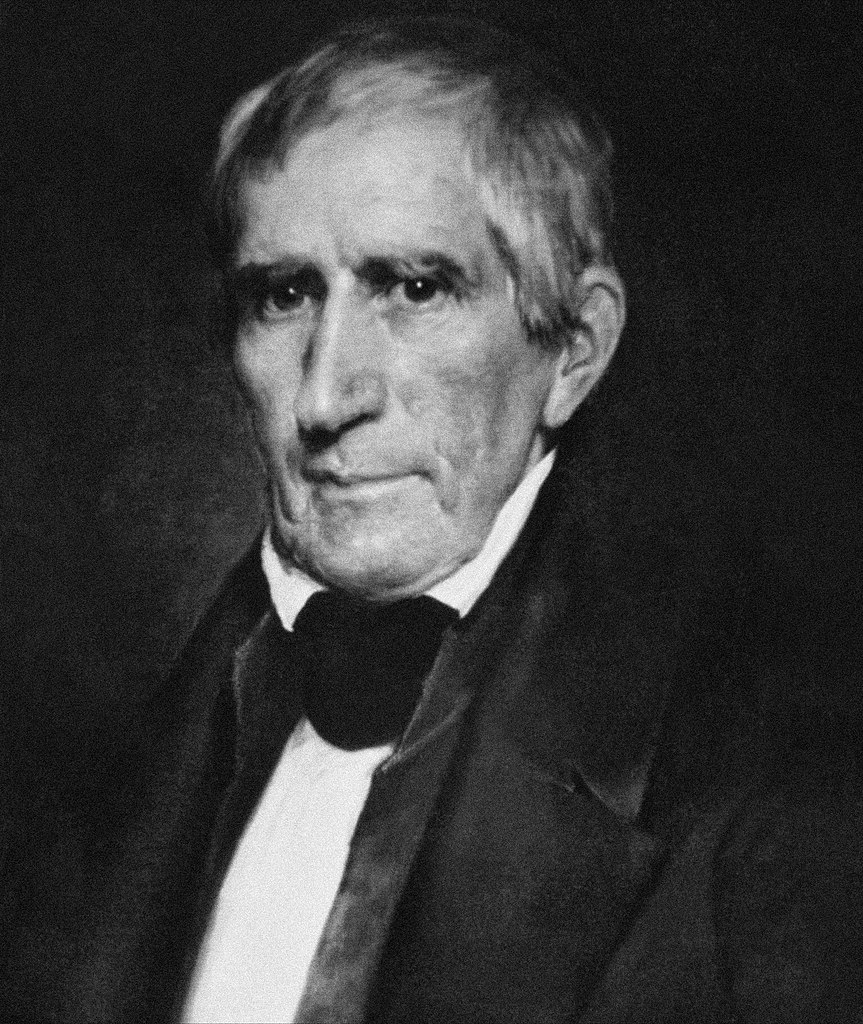 © Wikimedia.org/Albert Sands Southworth, CC0
© Wikimedia.org/Albert Sands Southworth, CC0
Martin Van Buren (/væn ˈbjʊərən/ van BYURE-ən; Dutch: Maarten van Buren; Dutch pronunciation: [ˈmaːrtə(n) vɑn ˈbyːrə(n)] Listen; December 5, 1782 – July 24, 1862) was an American lawyer and statesman who served as the eighth president of the United States from 1837 to 1841. A primary founder of the Democratic Party, he served as New York's attorney general, U.S. senator, then briefly as the ninth governor of New York before joining Andrew Jackson's administration as the tenth United States secretary of state, minister to the United Kingdom, and ultimately the eighth vice president of the United States when named Jackson's running mate for the 1832 election. Van Buren won the presidency in 1836, lost re-election in 1840, and failed to win the Democratic nomination in 1844. Later in his life, Van Buren emerged as an elder statesman and an important anti-slavery leader who led the Free Soil Party ticket in the 1848 presidential election. (Source: Wikipedia.org, CC BY-SA)
Andrew Jackson (March 15, 1767 – June 8, 1845) was an American lawyer, planter, general, and statesman who served as the seventh president of the United States from 1829 to 1837. Before being elected to the presidency, he gained fame as a general in the United States Army and served in both houses of the U.S. Congress. Although often praised as an advocate for ordinary Americans and for his work in preserving the union of states, Jackson has also been criticized for his racial policies, particularly his treatment of Native Americans. (Source: Wikipedia.org, CC BY-SA)
John Quincy Adams (/ˈkwɪnzi/ ; July 11, 1767 – February 23, 1848) was an American statesman, diplomat, lawyer, and diarist who served as the sixth president of the United States, from 1825 to 1829. He previously served as the eighth United States Secretary of State from 1817 to 1825. During his long diplomatic and political career, Adams also served as an ambassador, and as a member of the United States Congress representing Massachusetts in both chambers. He was the eldest son of John Adams, who served as the second president of the United States from 1797 to 1801, and First Lady Abigail Adams. Initially a Federalist like his father, he won election to the presidency as a member of the Democratic-Republican Party, and in the mid-1830s became affiliated with the Whig Party. (Source: Wikipedia.org, CC BY-SA)
 © Wikimedia.org/Library of Congress, CC0
© Wikimedia.org/Library of Congress, CC0

Time for recess! Post a comment, ask a question or write a review. Feel free to let us know what you think!
I want to get the greek driving license, so should i study from here and thats it for the oral exam ? thanks a lot
Complete solutions and walkthroughs for all Brain Test game levels. Get step-by-step guides and video tutorials to solve every tricky puzzle.https://braintest.games/
According to Article 14 this diagram is incorrect. You stay in the inside lane unless you are coming off at the FIRST exit only.
Aerial Silks, Aerial Yoga Hammock all in over 46 colors. Of No-low and Low-medium Stretch Silks. Aerial Lyra, Hardware and more! Build your response time with Aerials www.aerialsusa.com
Speedlimit signs in Norway are not just at the start of the speedlimit. Every speedlimit sign exept 50 and 80 are also placed with a specific distance between eachother as a reminding. If there is no speedlimit sign for a while, you are either in a 50 or 80 area, depending on the road and amout of houses/buildings
Most of these DOES NOT exist on the official Greek test. //Someone that not only practiced it in Greece, but also scraped sites that had the official test (1:1 copy to the official one) in order to build a better learning site than existing ones (still a work in progress).
I think the wording is a bit unlucky. "Warning for cyclists" is wrong. It's a "Warning OF cyclists FOR everybody". I think all those "Warning for X" signs should be "Warning of X" or "Warning against X". And then it's not really as specific as some of them are described. E.g. there's one that says "Warning for deer", which should be "Warning against wildlife crossing". It's not deer, it could be warthogs or boars or foxes as well.
Traffic signs in Portugal follow European standards, using clear symbols and colors. They regulate speed, directions, and warnings https://bomcondutor.com.pt/ . Understanding them is essential for safe driving and avoiding fines or accidents.
This is a solid breakdown. But honestly, road safety starts with knowing the basics. Check this out for some cool tech related to it—might be worth a look: https://www.ainanobanana.pro
Driving tips are crucial, but people often forget the fun side of road trips. A good way to unwind is to play games while waiting in traffic, like maybe this cute puzzle game. <a href="https://chiikawapuzzle.art"; target="_blank">chiikawa puzzle</a>
Super useful for reviewing the driving code in Japan! I hope it will help me remember all the signs. Good luck to everyone taking the exam and play the https://sprunkiretake.io
This looks useful for studying! I hope it helps me not panic on the day of the exam. Fingers crossed for https://buzzcut.style!
Lot of info here, but I gotta say, knowing the right tire pressure is a game changer. Keeps your ride smooth and safe—check out this tool for some handy pixel art that might spark your creative side too. https://www.wplace.pro
To sum-up: A-3 and A-4 are wrong - the sign only tells you the direction of the first curve, the second one can be whatever A-6d and A-6e are not about sharpness, but about the incoming roads being one-way towards the road you're currently on A-18a is not about cattle specifically, but about farm animals or domesticated animals A-18b is not limited to deer, but any wild animals that might suddenly appear on the road, like elk or boars B-32a is literally "border control", but may also have different variations with different text meaning in general "stop here until you're explicitly allowed to go" All that info can be found on wikipedia.
A-4 also wrong. It means "dangerous curves — first to the left", the second one can be either left or right. It doesn't specify.
Wrong. This is A-6d, which "entry of the one-way road from the right". Nothing about sharpness. See: https://en.wikipedia.org/wiki/Road_signs_in_Poland
The questions are pretty good, but unfortunately there's no variety at all. Would be nice if there were questions about things other than the signs, which are arguably one of the easiest parts of traffic rules
If you don’t wear a seatbelt, you’re just asking for trouble. Plus, knowing how to handle slippery roads is crucial, or you’ll end up in a ditch. For those who enjoy homegrown food, check this out for some cool garden-to-table ideas. https://www.growagardenrecipes.pro
Look, safety on the road is no joke. All that talk about seatbelts and tire pressure? Spot on. But hey, if you're into photography too, check out this neat tool for some cool filters. Could make your car pics pop a bit more, ya know? https://www.digitalcamerafilter.art
A lot of good info here, but let's be real—nobody thinks about tire pressure until it's too late. By the way, if you're looking for something to get those creative juices flowing, check out this :https://www.my-doodle.art
<a href="https://www.memecoldplay.com"; rel="noopener noreferrer nofollow">memecoldplay</a>
Look, all this stuff is basic driving knowledge. But seriously, if you're gonna drive, at least know when to ditch the old-school habits. Check out this game to blow off some steam after a long drive, it’s got some epic battles <a href="https://www.animefinalstrike.org"; target="_blank">animefinalstrike</a>.
The polish sign "Curve of the main road" is actually a complimentary sign showing the "actual course of priority road" and there are several thousand variations of it as this is often "crossroad specific"
This goat is so beautiful! Living in the wild makes it look a bit thin. You can check out my website about whatsmyname的.https://whatsmynameapp.net/
More community